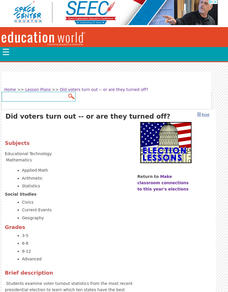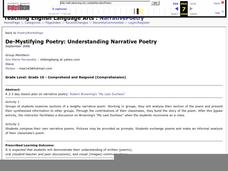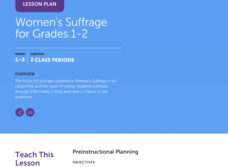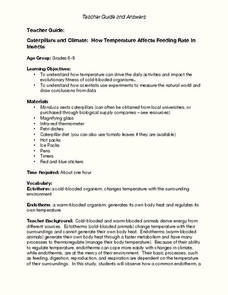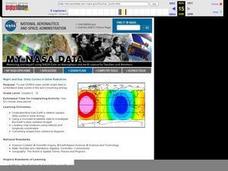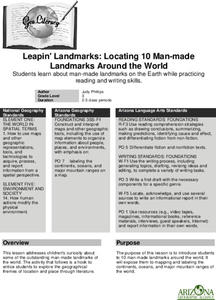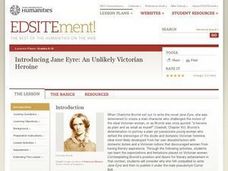Earth Day Network
Filtering Water
See the water filtration system up close with a fun science experiment. Young scientists work for several class periods to design a water filter using household objects, and then decide which filter material would be most effective in...
Curated OER
World War II - War Comes to Hawaii
Ninth graders use geographic representations to organize, analyze, and present information on people, places, and environments. They use tools and methods of geographers to construct, interpret, and evaluate qualitative and quantitative...
Curated OER
Did Voters Turn Out -- or Are They Turned Off?
What was the voter turnout at your last state election? Examine voter turnout statistics from the most recent election to learn which ten states have the best turnout record. This lesson offers election data, handouts, and worksheets.
Curated OER
De-Mystifying Poetry: Understanding Narrative Poetry
Tenth graders explore narrative poetry. They analyze sections of a poem and present to groups. They compose their own narrative poems using pictures as prompts. They exchange their poems and analyze their classmate's poem.
Curated OER
Scientific Method: How Many Drops of Water Fit on a Coin?
Young investigators conduct an experiment using the scientific method. They see how many drops of water fit on a coin; have them conduct several different trials. This involves making a hypothesis, looking at controls, and introducing...
Scholastic
Women's Suffrage for Grades 1–2
Scholars take part in a grand conversation after they examine facts and stories about the Women's Suffrage Movement. Eight discussion questions bring light to influential women, the importance of voting, citizenship, and voting rights.
Science 4 Inquiry
The Impact of the Sun and Moon on Tides
In 150 BC, Seleucus of Seleucia theorized that the moon causes the tides. Scholars learn about what causes tides by studying the interactions of gravity between the sun, moon, and Earth. They use technology to formalize otherwise...
California Academy of Science
Nuclear Energy: What's Your Reaction?
OSHA confirms that rules governing worker safety at nuclear power plants ranks higher than worker safety in offices. Scholars must consider safety, cost, alternatives, and other factors before recommending whether a town should build a...
Curated OER
What's The Big Deal About Accutane?
Students take on the role of epidemiologists. They investigate an "outbreak" in serious birth defects that occur in infants born to teenage girls. students discover a link between the use of the acne drug called Accutane and birth defects.
Curated OER
Prairie Scavenger Hunt
Middle schoolers take a close look at the prairie environment. They identify common plants and animals of the prairie. In addition, pupils work in teams in order to put together a presentation on a certain aspect of the prairie...
Curated OER
Science: Seed by Design
Students, working in groups, create "artificial seeds" for a wind dispersal experiment. After trial runs, they redesign their seeds, and re-test them under the same conditions. Finally, they interpret, compare, and evaluate the original...
Curated OER
Dining Out With Fishes and Birds of the Hudson
While this lesson focuses on the birds and fish found on the Hudson River, it could be adapted for use in any classroom. Using a vocabulary list, learners explore the meaning of words like adaptation, habitat, barbel, and more. Then,...
Curated OER
Dining Out With Fishes and Birds of the Hudson
The class will make observations to determine how environment has shaped the way particular birds and fish eat. They will view a series of photographs, read two short articles, and then consider how food availability has determined how...
Curated OER
Caterpillars and Climate: How Temperature Affects Feeding Rate In Insects
Do you eat more when you are hot or when you are cold? Young scientists observe the eating pace of two caterpillars at different temperatures. The differences in endotherm and ecotherm animals' ability to adjust to temperature change...
Discovery Education
Make it all Better!
Discover how innovations can help your school and community. In the three-part STEM lesson, scholars learn the meaning of innovation and brainstorm innovations in their schools. They identify issues in their communities and think of...
Science 4 Inquiry
Introducing the Types of Energy
Young scientists explore many different types of energy including light, heat, nuclear, sound, potential, and more. They match the types of energy and identify when energy transfers from one type to another.
American Statistical Association
More Confidence in Salaries in Petroleum Engineering
Making inferences isn't an exact science. Using data about salaries, learners investigate the accuracy of their inferences. Their analyses includes simulations and randomization tests as well as population means.
Curated OER
Categorizing Objects
Kindergartners practice the important skill of placing things in their correct categories. They must discern between items of clothing and items of food. The use of the Inspiration 7 educational software is effectively used in this...
Curated OER
NIGHT AND DAY: DAILY CYCLES IN SOLAR RADIATION
High schoolers examine how Earth's rotation causes daily cycles in solar energy using a microset of satellite data to investigate the Earth's daily radiation budget and locating map locations using latitude and longitude coordinates.
Curated OER
Leapin' Landmarks: Locating 10 man-made landmarks around the world
Third graders engage in a activity which addresses their curiosity about some of the outstanding people-made landmarks of the world. They explore the geographical themes of location and place through literature.
Curated OER
Mucket Mania: The Mussel Industry in Arkansas
Middle and high schoolers read and discuss articles about the mussel industry in Arkansas. They pay close attention to the history of pearling and button making industries on the Black and White Rivers of Arkansas. This impressive,...
Curated OER
Introducing Jane Eyre: An Unlikely Victorian Heroine
Young scholars investigate the expectations and limitations placed on Victorian women and evaluate Charlotte Bronte's position and desire for literary achievement in using the male pseudonym, Currer Bell.
Curated OER
Family Life in the 1830s
Students compare and contrast family life today with family life in the 1830s. They conduct research on Old Sturbridge Village, read primary source documents, and develop a list of generalizations comparing/contrasting families of the...
Curated OER
All the World's a Stage
Is the circus a form of theater? Read "A City of Clowns? What Else Is New?" to sway your class that a circus, is indeed, a theatrical performance. Critical thinkers compare/contrast various forms of theater and identify what makes the...




